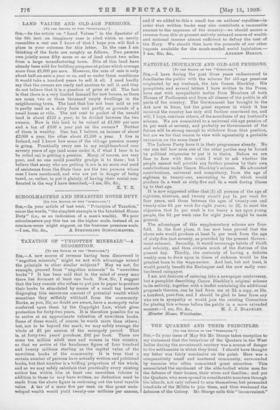NATIONAL INSURANCE AND OLD-AGE PENSIONS.
[TO rue EDITOR OT Tan "SPROTATOR."1 SIR,--I have during the past three years endeavoured to familiarise the public with the scheme for old-age pensions originated by my husband, the late Canon Blackly. His pamphlets. and several letters I have written to the Press, have met with sympathetic notice from Members of both Houses of Parliament and from all classes of the public in all parts of the country. The Government has brought in the Act now in force, but the great expense in which it has involved the country has only still further convinced me, and will, I hope, convince others, of the soundness of my husband's scheme. We are committed to a universal old-age pension of 5s. per week at seventy, and probably no Government of the future will be strong enough to withdraw from that position, but are we for that reason to view with equanimity a probable extension on the same lines P
The Labour Party have it in their programme already. No one can tell how soon one of the other parties may be forced by political exigencies to put it in theirs. Before we are face to face with this crisis I wish to ask whether the people cannot well provide any further pension by their own contributions under Canon Blackley's scheme. He advocated contributions, universal and compulsory, from the age of eighteen to twenty-one, amounting to £10, which would produce 5s. a week at sixty-five and 8s. a week during illness up to that age.
It is now suggested either that (1) all persons of the age of eighteen, nineteen, and twenty should pay 1s. per week for four years, and those between the ages of twenty-one and twenty-nine 6d. per week for eight years; or (2), to meet the objection that ls. per week is too heavy a tax upon young people, the 61 per week rate for eight years might be made general.
The advantages of this supplementary scheme are four- fold. In the first place, it has now been proved that the above rate would produce at least 7s. per week from the age of sixty-five (not seventy, as provided by the present Govern- ment scheme). Secondly, it would encourage habits of thrift and sobriety, and thus obviate much of the distress of the present day. Thirdly, the certainty of having a definite weekly sum to draw upon in times of sickness would be the greatest boon to the wage-earner. And last, but not least, it would greatly benefit the Exchequer and the now sadly over- burdened ratepayer.
I am not desirous of entering into a newspaper controversy, but a pamphlet describing Canon Blackley's original scheme in its entirety, together with a leaflet containing the additional proposals thereon, can be had from me at 2d. a copy, or 10s. a hundred, post-free, and I should be glad to hear from any who are in sympathy or would join the existing Committee for placing this scheme before the public in a more extended










































 Previous page
Previous page